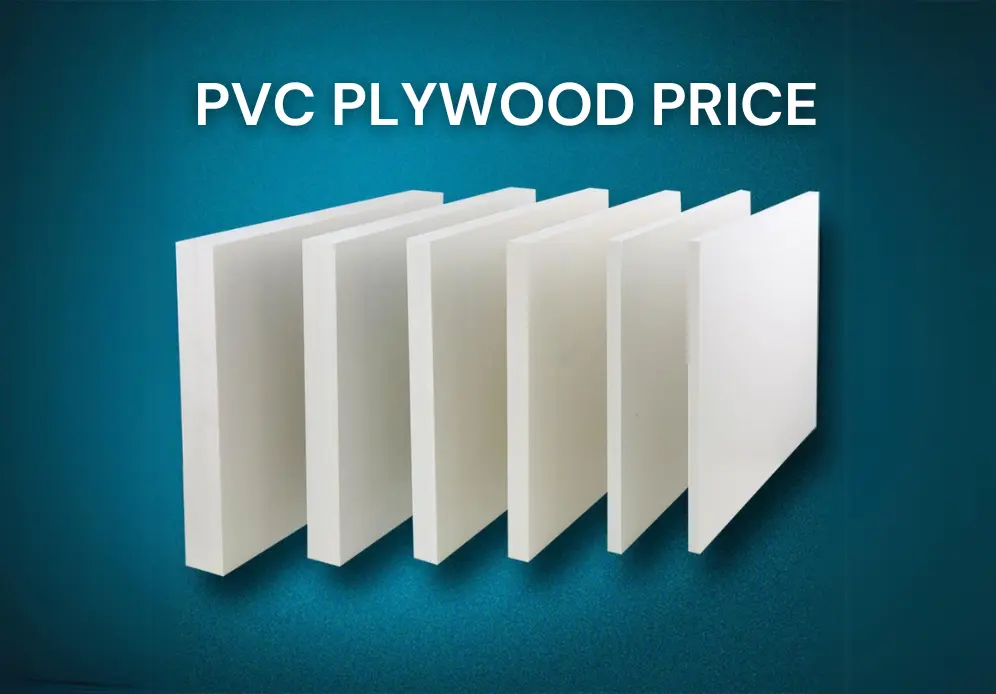PVC plywood is gaining popularity as a versatile and durable material for a range of applications, from construction to interior design. Its resistance to moisture and ease of maintenance make it an attractive choice for many projects.
If you’re considering PVC plywood for your next endeavor, understanding its pricing is essential. This guide will provide an in-depth look at PVC plywood prices, the factors that affect them, and answers to common questions.
What Is PVC Plywood?
PVC plywood is a synthetic alternative to traditional wood plywood. Made from a blend of PVC (polyvinyl chloride) and other materials, it offers a range of benefits, including water resistance, fire resistance, and low maintenance.
Unlike traditional plywood, which is made from layers of wood veneer, PVC plywood is entirely synthetic, which contributes to its unique properties and cost structure.
Factors Affecting PVC Plywood Prices
Several key factors can influence the price of PVC plywood:
Thickness: The thickness of PVC plywood can impact its price. Thicker sheets are generally more expensive due to the increased amount of material and production complexity.
Size: PVC plywood comes in various sizes, with the most common being 4×8 feet. Larger or custom-sized sheets may come at a premium. Standard sizes are often more cost-effective than custom options.
Grade: PVC plywood is available in different grades, which can affect its durability and finish. Higher grades, which have fewer imperfections and a smoother surface, tend to be more expensive.
Finish: The type of finish applied to PVC plywood can also impact its price. Options include glossy, matte, and textured finishes. Specialty finishes or pre-finished plywood generally cost more than untreated options.
Supplier and Location: Prices can vary based on the supplier and geographical location. Local suppliers, online retailers, and specialty stores may offer different pricing and availability.
Average Price Range
The cost of PVC plywood can vary based on the factors mentioned. Here’s a general price range for different thicknesses:
- 3mm thick: $20 – $40 per sheet
- 6mm thick: $40 – $70 per sheet
- 12mm thick: $70 – $120 per sheet
These prices are approximate and can fluctuate based on market conditions and supplier pricing. Always compare prices from multiple sources to get the best deal.
Where To Buy PVC Plywood
PVC plywood can be purchased from several sources:
- Home Improvement Stores: Major retailers like Home Depot and Lowe’s offer a range of PVC plywood options in standard sizes and grades.
- Lumber Yards: Local lumberyards may provide a broader selection of PVC plywood and potentially better prices for bulk purchases.
- Specialty Suppliers: For higher quality or specialty PVC plywood, visit stores that specialize in synthetic building materials or interior design supplies.
- Online Retailers: Websites such as Amazon, eBay, and specialized online plywood suppliers offer the convenience of shopping from home. Keep in mind that shipping costs may impact the overall price.
Cost-Saving Tips
To get the most value out of your PVC plywood purchase:
- Buy in Bulk: Purchasing larger quantities often reduces the cost per sheet. If you have multiple projects or need a significant amount of PVC plywood, buying in bulk can be economical.
- Compare Prices: Don’t settle for the first price you find. Check prices from various suppliers to ensure you’re getting the best deal.
- Look for Sales and Discounts: Watch for promotions and discounts at local stores and online. Special offers can help reduce the cost of PVC plywood.
- Consider Alternative Finishes: If a specific finish isn’t necessary for your project, opting for a basic or untreated finish can save money.
Conclusion
PVC plywood offers a durable and versatile alternative to traditional wood plywood, with unique properties that make it suitable for various applications. Understanding the factors that affect its price and knowing where to purchase it can help you make informed decisions and stay within your budget.
By considering thickness, size, grade, finish, and supplier options, you can find the best PVC plywood for your needs at a cost that fits your budget.
Frequently Asked Questions (FAQs)
Why Is PVC Plywood More Expensive Than Traditional Plywood?
PVC plywood tends to be more expensive due to its synthetic composition and advanced properties, such as water and fire resistance. The production process and material costs contribute to the higher price.
How Can I Determine The Quality Of PVC Plywood?
The quality of PVC plywood is typically reflected in its grade and finish. Higher-grade plywood will have fewer defects and a smoother surface. Inspect the plywood for visible imperfections and check the grade label.
Can PVC Plywood Be Used For Outdoor Applications?
Yes, PVC plywood is suitable for outdoor use due to its resistance to moisture and weathering. However, ensure that it is appropriately treated or designed for external conditions to maximize its longevity.
How Do I Choose The Right Thickness For My Project?
Select the thickness based on your project’s requirements. Thicker plywood is better for structural applications and heavy-duty uses, while thinner sheets are suitable for lighter or decorative projects.
Is PVC Plywood Easy To Work With?
Yes, PVC plywood is generally easy to work with. It can be cut, drilled, and shaped with standard tools. Its low maintenance and durability make it a practical choice for many applications.

